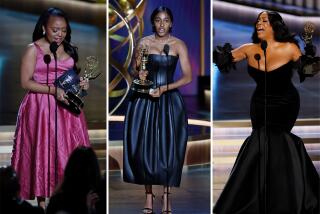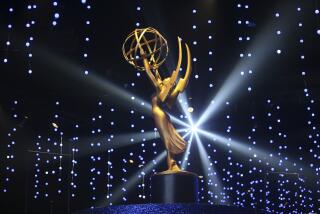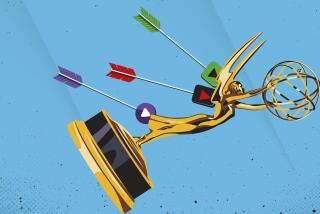‘Orphan Black,’ Emmy snubs and questions of identity
The chronology of recent Big Public Events in Television — the Emmy nominations announcements followed a few weeks later by Comic-Con — spotlights an almost identical philosophical issue: There’s the Emmy nominations, and then there’s Comic-Con. Reality goes metaphor.
An estimated 130,000 Comic-Con attendees descended on the San Diego Convention Center over the last few days in large part to pledge their devotion to certain shows, but only a few of those shows (“Game of Thrones,” “The Big Bang Theory,” “American Horror Story”) are part of the Emmy race this year.
Popularity does not denote quality, of course, but many of the dramas that filled the big halls are as critically acclaimed as they are inevitably excluded from awards season. “The Walking Dead” may be the current record-holder of Unfair Snubs, with “Battlestar Galactica” coming in a close second, but this year, the clash between the Comic-Con ethos and the television academy’s archaic definition of “outstanding” went nuclear with the exclusion of BBC America’s “Orphan Black.”
Virtually every person who watches television for a living (i.e. critics, reporters, bloggers) agreed that Tatiana Maslany, who stars as an ever-widening assortment of clones, deserved a nomination. The trick of one actor playing more than one role has been a favorite of television since Patty Duke took on identical cousins in the ‘60s, but never before has an actor taken on such a wide array of characters with such astonishing subtlety and success.
But “Orphan Black” is much more than a platform for a talented performer; it’s a smartly written, carefully constructed exploration of identity, of the shifting tension between our differences and our similarities. The science at its center may be a bit more imaginative than the creation of perfect meth, but it’s still an important show, right up there with “Mad Men,” “Game of Thrones,” “Orange Is the New Black” and all the other series that have recently put the focus back in television.
Like all good sci-fi writers, creators Graeme Manson and John Fawcett use the possible to explore the actual. The clones embody the notion that within our chemical essence lie all manner of derivations. Gay, straight and transgender; moralist, survivalist and psychopath; tyrant, victim and savior. The human code contains all possibilities, even when it is the code of just one human.
What more “prestigious” narrative theme is there?
Some of the snobbery shown sci-fi and fantasy is undoubtedly due to the freedom the genre has offered, particularly recently, to nontraditional characters (the female warrior) and unconventional relationships. “Orphan Black” is very much set in the present and peopled with many “conventional” characters — the con woman, the soccer mom, the spectacled scientist — yet it pushes past traditional boundaries with absolutely no self-congratulation.
It’s certainly one of the most gay-friendly shows on television. Felix (Jordan Gavaris), foster brother to main clone Sarah (Maslany), may be eyeliner-and-silk-scarf fabulous but he’s the clones’ main fixer, truth teller and emotional glue. He is also allowed his own sexually active life, which affords “Orphan Black” scenes that are frank without being politically or sexually sensational; Felix is that still-rare character who just happens to be gay.
The same is true for the brilliant Cosima (Maslany), who in Season 1 became romantically involved with Delphine (Evelyne Brochu), a scientist working for the potentially evil lab monitoring the clones. The women’s relationship was loving, sexual and not the point of the show. Even with a lot of competition from “The Fosters” and “Orange Is the New Black,” Cosima is, hands down, the coolest lesbian on television.
Likewise, “Orphan Black,” though obviously female-centric, does not make bank on the “revelation” that women can be good and bad, timid and violent, strong and susceptible Just Like Men. Instead, it plays with the nature of family with the same dexterity it brings to the definition of identity. What is a mother, a child, a sister, a friend, and what is expected of and owed to each?
So yes, it’s cool that they’re clones, caught in a vast conspiracy that involves high-tech labs and military possibilities. Yes, it’s thrilling to contemplate the future possibilities, the opposing views of genetic tinkering and science in general. But “Orphan Black” is not a geek show any more than Comic-Con is a geek fest.
When an outlier sensibility has been so embraced by the mainstream, it can no longer be considered outlier. Put another way, it’s hard to argue that something is unconventional when it is occupying a convention center.
Like many of the shows that entertained the crowds in San Diego, “Orphan Black” is a fascinating character-driven drama filtered through a version of reality altered, just a bit, by writerly imagination.
Which is, after all, exactly how you could define “The Sopranos.”
Sign up for the Envelope Newsletter
More to Read
The complete guide to home viewing
Get Screen Gab for everything about the TV shows and streaming movies everyone’s talking about.
You may occasionally receive promotional content from the Los Angeles Times.







